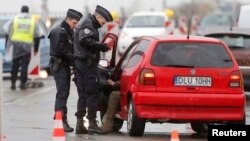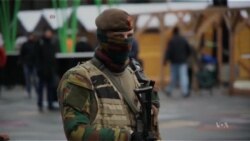Brussels may have returned to some degree of normalcy on Wednesday, with some schools reopening and trains running. But the situation remains tense as the biggest security operation in Belgium since World War II continues, with a new international arrest warrant released and one Paris attack suspect still at large.
The latest events have reopened difficult discussions about what could have been done to prevent the attacks, the future of the visa free “Schengen zone” and challenges of radicalizations in Belgium and elsewhere in Europe.
At least three of the people involved in the November 13 Paris attacks — including the mastermind, Abdelhamid Abaaoud — came from Belgium, leaving the state security apparatus under intense scrutiny.
But Johan Verbeke, Belgian Ambassador to Washington, tells VOA that Brussels rejects the idea that everything was plotted and planned in his country, calling it “just a common endeavor by radical extremist terrorists who have joined hands in planning, in executing those attacks.”
While he agrees that the cooperation among security structures in the country should improve, Ambassador Verbeke says there was no indication ahead of the attacks that something was brewing in Brussels, neither among domestic security structures nor foreign services in Europe or America.
“We were utterly in the dark,” he says. "We discovered together with our French friends what horrible things had happened in Paris, what horrible things had been also planned in Brussels.”
Schengen zone
One of the uncomfortable questions being asked is whether the Schengen zone, a borderless area among 26 countries in Europe, where citizens travel freely and with minimal control, can survive. For ambassador Verbeke, there are no doubts.
“The Schengen area — which we better call by its better name, the space of liberty, where people can go from one country to the other without major obstacles — is one of the key points that we have acquired though our European integration and we should not just give it up as we face some problems right now.”
But some are less certain.
“It is an existential issue, quite frankly, for the future of a borderless European Union,” says Peter Westmacott, the British Ambassador to the United States.
Although Britain is not in the Schengen area, ambassador Westmacott says Europe needs to address the future of Schengen, which mean some changes needs to be made.
“Those of us who are outside Schengen, we will be even more anxious to ensure that our national border controls are effective,” he says. “So that we pick those people up at the border before they’ve had a chance to do harm.”
Both Verbeke and Westmacott agree that there should be more external control scrutiny, improvement of systems to exchange information and that border controls should be able to be reinstated in urgent situations.
Radicalization
For many European officials grappling with national security, a more intractable problem is radicalization of European nationals, such as the authors of the latest Paris attacks.
Both Belgium and France have been criticized for letting problems fester in marginalized neighborhoods, including those where there are many vulnerable youth from Muslim families.
While acknowledging struggles faced by member of these marginalized communities, Ambassador Verbeke rejects the implication of wholesale radicalization, calling it an individual issue.
“We rather must look at those younger people, [whom], because of their youth," poverty and lack of life options, "are more vulnerable and therefore the call for adventure is much more inviting.”
Belgium has seen more nationals per capita travel to fight alongside IS militants than any other country.
William McCants of the Washington-based Brookings Institution tackles this vulnerability in his latest book, The ISIS Apocalypse: The History, Strategy, and Doomsday Vision of the Islamic State. He tells VOA there is something about IS’s deep countercultural appeal that draws in some youth.
“The Islamic State deliberately provokes an identity crisis among Muslims, particularly living in the West," he says. “It carries out horrible acts and it justifies those acts by citing Islamic scripture. And so the youth, when confronted with it, have to decide ‘does this really represent my faith or is this completely beyond the bounds'? Often times they haven’t even heard of these scriptures that are being cited by the Islamic State. This creates a cognitive opening for many of these youth.”
But Ambassador Verbeke says Belgium is an open, cosmopolitan country and is not giving up on its values. Still, though, he says that more can be done.
“We are going to make greater efforts to integrate the Muslim community in the tissue of our society,” he says. “So we are indeed that kind of ... multiethnic, some people say multicultural society, of which we are proud”.
Westmacott, the British Ambassador, says there is no magic formula to resolve this issue, but that it is important not to alienate groups simply because of the actions of a small number of individuals.
In the meantime, European countries will grapple with neutralizing those involved in the Paris attacks while addressing societal marginalization in a region where open borders — long a source of pride — have become, at least for now, a source of anxiety.






